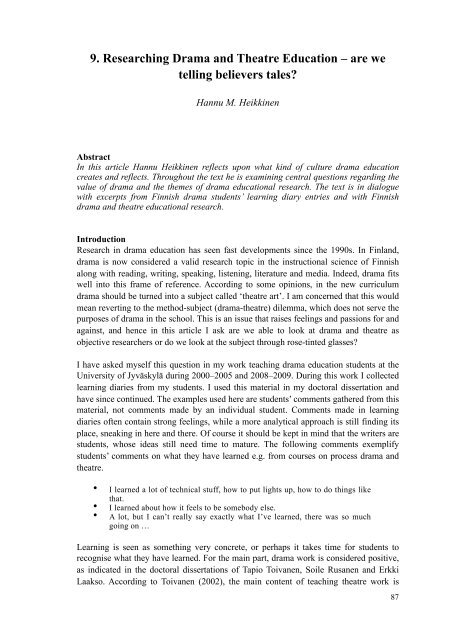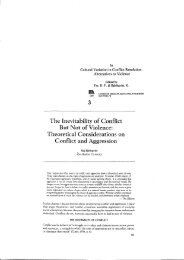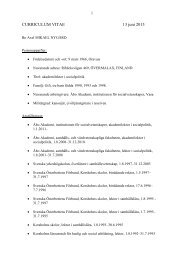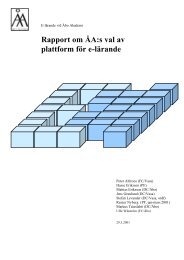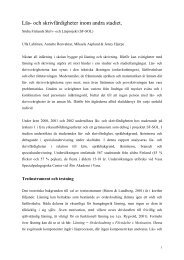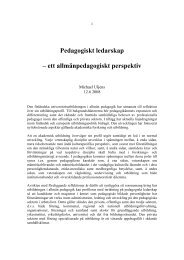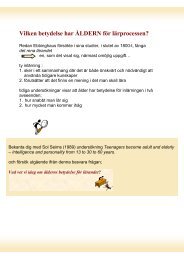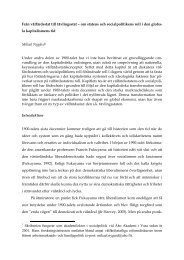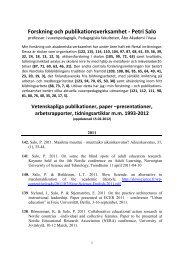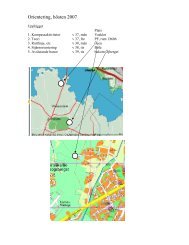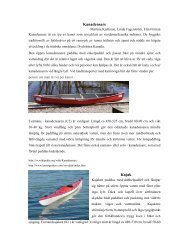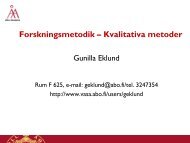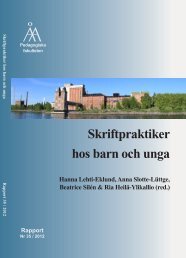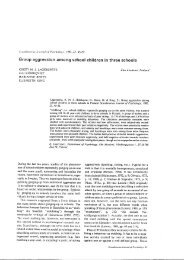Drama Boreale - Åbo Akademi
Drama Boreale - Åbo Akademi
Drama Boreale - Åbo Akademi
You also want an ePaper? Increase the reach of your titles
YUMPU automatically turns print PDFs into web optimized ePapers that Google loves.
9. Researching <strong>Drama</strong> and Theatre Education – are we<br />
telling believers tales?<br />
Hannu M. Heikkinen<br />
Abstract<br />
In this article Hannu Heikkinen reflects upon what kind of culture drama education<br />
creates and reflects. Throughout the text he is examining central questions regarding the<br />
value of drama and the themes of drama educational research. The text is in dialogue<br />
with excerpts from Finnish drama students’ learning diary entries and with Finnish<br />
drama and theatre educational research.<br />
Introduction<br />
Research in drama education has seen fast developments since the 1990s. In Finland,<br />
drama is now considered a valid research topic in the instructional science of Finnish<br />
along with reading, writing, speaking, listening, literature and media. Indeed, drama fits<br />
well into this frame of reference. According to some opinions, in the new curriculum<br />
drama should be turned into a subject called ‘theatre art’. I am concerned that this would<br />
mean reverting to the method-subject (drama-theatre) dilemma, which does not serve the<br />
purposes of drama in the school. This is an issue that raises feelings and passions for and<br />
against, and hence in this article I ask are we able to look at drama and theatre as<br />
objective researchers or do we look at the subject through rose-tinted glasses?<br />
I have asked myself this question in my work teaching drama education students at the<br />
University of Jyväskylä during 2000–2005 and 2008–2009. During this work I collected<br />
learning diaries from my students. I used this material in my doctoral dissertation and<br />
have since continued. The examples used here are students’ comments gathered from this<br />
material, not comments made by an individual student. Comments made in learning<br />
diaries often contain strong feelings, while a more analytical approach is still finding its<br />
place, sneaking in here and there. Of course it should be kept in mind that the writers are<br />
students, whose ideas still need time to mature. The following comments exemplify<br />
students’ comments on what they have learned e.g. from courses on process drama and<br />
theatre.<br />
• I learned a lot of technical stuff, how to put lights up, how to do things like<br />
that.<br />
• I learned about how it feels to be somebody else.<br />
• A lot, but I can’t really say exactly what I’ve learned, there was so much<br />
going on …<br />
Learning is seen as something very concrete, or perhaps it takes time for students to<br />
recognise what they have learned. For the main part, drama work is considered positive,<br />
as indicated in the doctoral dissertations of Tapio Toivanen, Soile Rusanen and Erkki<br />
Laakso. According to Toivanen (2002), the main content of teaching theatre work is<br />
87


